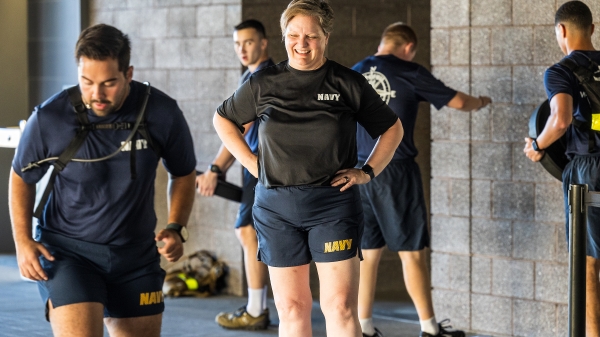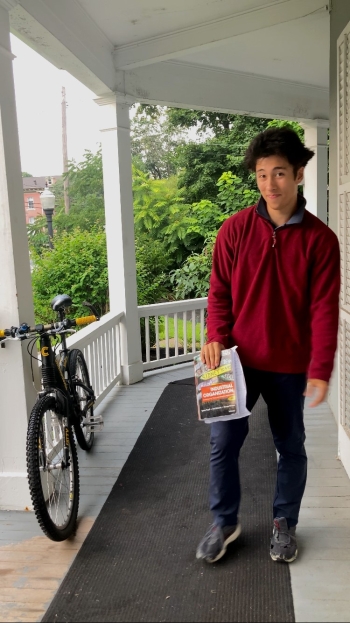Like many young people, Kaden Hartley Yokota’s high school experience was disrupted by the pandemic. But he realized that he enjoyed learning online and he collected a lot of college credits while in high school.
And, with the help of his ASU Online advisor, he was able to graduate with his bachelor’s degree this summer at age 19 after only one year at Arizona State University.
Yokota, who lives in the rural community of Red Hook, in upstate New York, says he was able to save a lot of money while earning his Bachelor of Science in economics.
“When going through schooling online, I came to see the value and efficiency of online learning. In my junior and senior years, I attended high school during the day, Bard College in the afternoon and Dutchess Community College online, asynchronously,” said Yokota, who also took International Baccalaureate and Advanced Placement courses in high school, which also earn college credits.
In high school, Yokota was at the top of his class and was voted “most likely to go into space.” In addition to Arizona State University, he was accepted to the University of Pennsylvania, the Rochester Institute of Technology and Boston University.
But two months before he graduated, his father died of a brain aneurysm rupture.
“He was our household’s sole income earner, so with my sister and I both entering university, family living costs became an immediate burden,” he said.
ASU Online was an attractive option because of the many majors offered and the large number of transfer credits allowed. He started attending ASU Online last summer after he graduated from high school and thought he might transfer to Boston University, where he had a partial scholarship.
“But after going through my first courses at ASU Online, I found the program to be awesome and the course delivery system better than either of the two colleges I previously attended,” he said.
“Working with my new ASU academic advisor, she helped me understand how I could get through college coursework quickly so I could potentially enter the workforce sooner.”
In addition to earning college credits in high school, Yokota earned 39 credits through the College Level Examination Program, in which students can earn credit by passing an exam in lieu of taking the course. Typically, each CLEP exam costs $95, but he was able to take them for free thanks to the Modern States Education Alliance, a nonprofit higher-education program available to any student.
Yokota took the CLEP exams one after another during his summer 2023 term at ASU Online.
“It was intense, but it was also fun to bury my head in something and not really think about what was going on with my family,” he said.
Even with all the CLEP exams, he earned a 4.0 GPA in that first summer term and his advisor allowed him to take 21 and 22 credits in the fall and spring terms, finishing with four credits this summer.
“She had known about the death of my father, and my goals at ASU to graduate quickly and inexpensively because I was planning on entering the workforce soon so I could help support my family and pay off student debt as soon as possible,” he said.
“ASU’s flexibility in allowing me to take many courses per quarter is one of the most significant factors that influenced my early graduation date,” he said.
In addition to all the coursework, Yokota started an online business in which he scoured vintage items in upstate New York and sold them on eBay, making thousands of dollars.
“I’ve saved money by continuing to live at home, time by not having to commute and accruing less unsubsidized federal student loan interest, and, of course, the time opportunity cost of the traditional three or four extra years,” he said.
“I’ve always been mature and academically advanced for my age and enjoyed being in more mature groups, so attending ASU Online with other more mature adults with professional careers has been great for building my professional network and community, which I don’t think I could have gained as easily attending in person.”
Yokota answered some questions from ASU News.
Editor's note: Answers have been edited for length and/or clarity.
Question: What was your “aha” moment when you knew you wanted to major in economics?
Answer: I was a hard-core science student. I'm pretty amazed that I didn't major in the natural sciences. But economics kind of stood out because of the broad relevance to what was going on in the world at the time — and actually all the time.
I also had a custodial bank account with my father since I was 13. And it was probably one of the best things they've done for me. So for birthdays and Christmas presents, they would give me $100 to invest in my favorite stocks, where I lost quite a bit of money, of course — and that was one of the lessons I'm sure that they wanted to teach me.
And so in tracking my investments when I was in high school in 2020, the Federal Reserve basically said that interest on the federal funds rate was considered zero. It stimulated the economy, the S&P skyrocketed and the overall economy kind of lagged a little bit after that. And it was super interesting and I wanted to know the mechanisms for how it worked.
Q: What was something you learned at ASU that changed your perspective?
A: One course was particularly influential in how I see firms and markets. It was the Industrial Organization and Competition Policy course. Most of the economics classes that I had taken focused on the macro — they kind of deal in extremes; so perfect competition or monopoly. And the reality is that most firms and most markets actually are in between that. And traditional economic theory says that in a perfect competition scenario, long-run economic profits are equal to zero. And that’s not truthful in reality. So this class went into the area in between these extremes and how firms in the gray operate in terms of setting prices for their goods and the quantity to be produced.
The primary thing that shifted my perspective within economics is that in the real world, most firms with medium to large capital requirements can make a reliable economic profit. So it’s not as gloomy as some economic theory says.
Q: What was your favorite place to study?
A: Oh, the library for sure. I specifically like my town's public library because it's consistent hours. I usually choose to sit at a desk where there's a little bit of public traffic so that there's an implicit social pressure to be there for productive reasons and not scrolling your phone for social media or something. So I'm always at my best productive time at the library.
Q: Were any of your professors particularly influential?
A: Joana Girante taught the economic development class that deals with the elements that make citizens in low- to middle-income countries better off. And so through her energy and passion for the subject and interacting with everyone, there's no way you can't be involved. Her interaction with her online students just really stands out.
Fernando Leiva-Bertran was the professor of the Industrial Organization and Competition Policy course. He simplified it. He brought things down to a basic level and said, "OK, this thing is true, this is not, so we have to admit these variables, or we have to do the math in a certain way that that makes sure the right conditions hold." He was a really great communicator at conveying this complex subject.
Q: What’s next for you?
A: I am going to study for the GRE because a lot of law schools are now accepting that for their entrance exams. I specifically want to be a patent attorney. This is kind of my obsession outside of economics for all my life.
I've always loved making things. And recently, I've enjoyed reading patent applications. And it’s clouded in legalese but if you begin to understand the core of it and cut down on all the adjectives, it's understandable. And I'm really interested in helping makers obtain patent rights for their novel innovations.
In the past year, I've been drafting five different utility patent applications, and after I take the GRE, I'll finalize and submit to the U.S. Patent Office as a pro se inventor. My type of video game is computer-aided design programs. The specific courses that I took at ASU were design methodology and entrepreneurship and value creation. Those have been influential for helping me create some of the drawings that are in my utility patent applications.
Q: If someone gave you $40 million to solve a world problem, what would you tackle?
A: I think global warming is probably top of the list for me. I want to plant trees. But as an economics major, you minimize the cost per planted tree. I want to plant the trees in an area of the world where there's a lower cost of labor so that the projected power of the $40 million is greater.
More Sun Devil community

These real-life heroes found educational support through ASU Online
When “God Bless America” played at Dani Bermudez’s naturalization ceremony, the moment gave her chills and cemented her resolve to one day serve in the military.The Colombia native enlisted in the…

Sun Devils in the sky
“Today was probably one of the most rewarding days I’ve had at ASU."That was the sentiment given by Andrew Vandertoorn, a C-17 evaluator pilot, first officer and 2002 Arizona State University…

A decorated life: Navy ROTC professor demonstrates leadership excellence
Katrina Hill has received just about every type of military and academic accolade there is and has demonstrated leadership capabilities throughout her time in the service.A Harvard and MIT Fellow. A…
